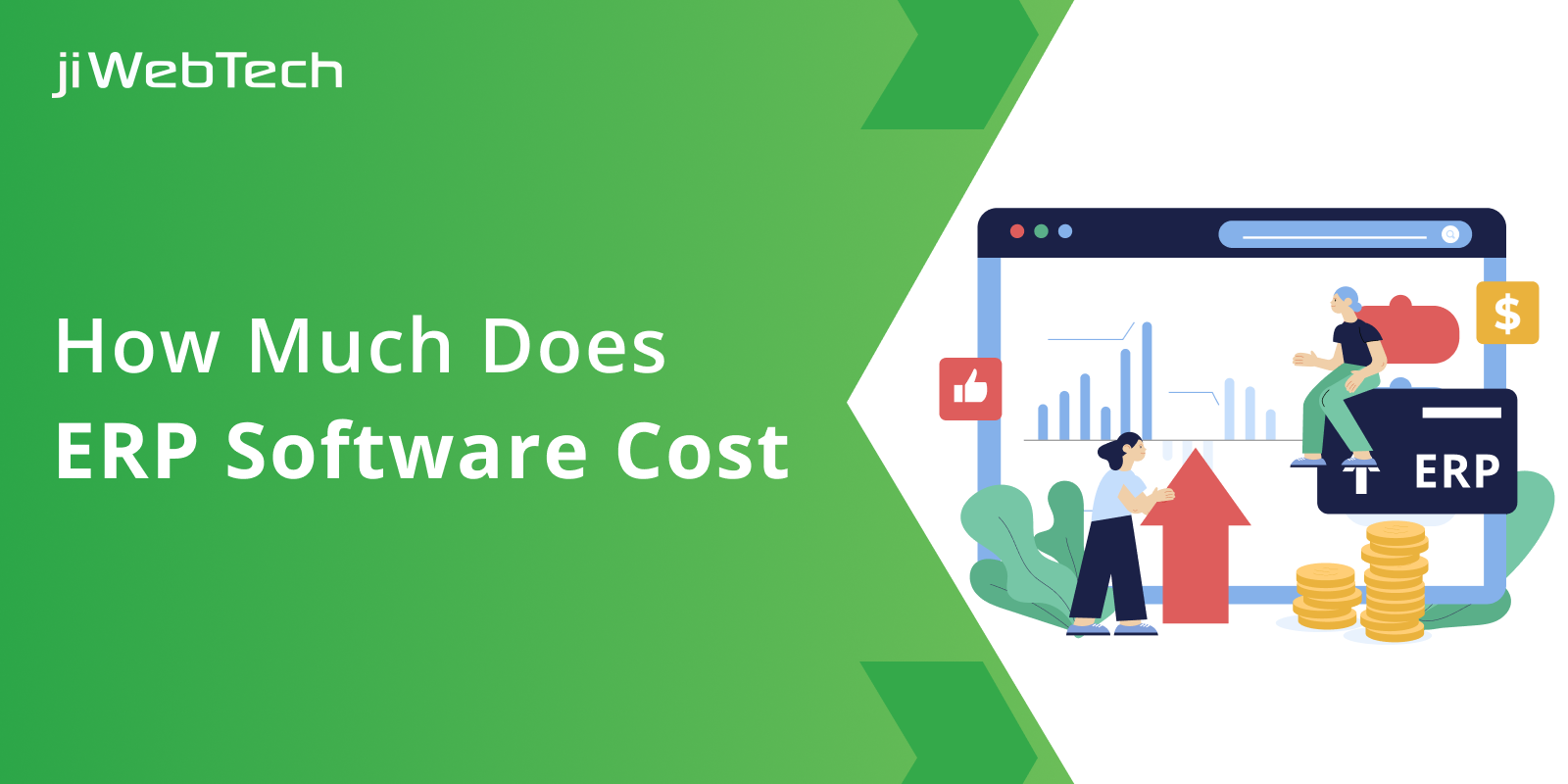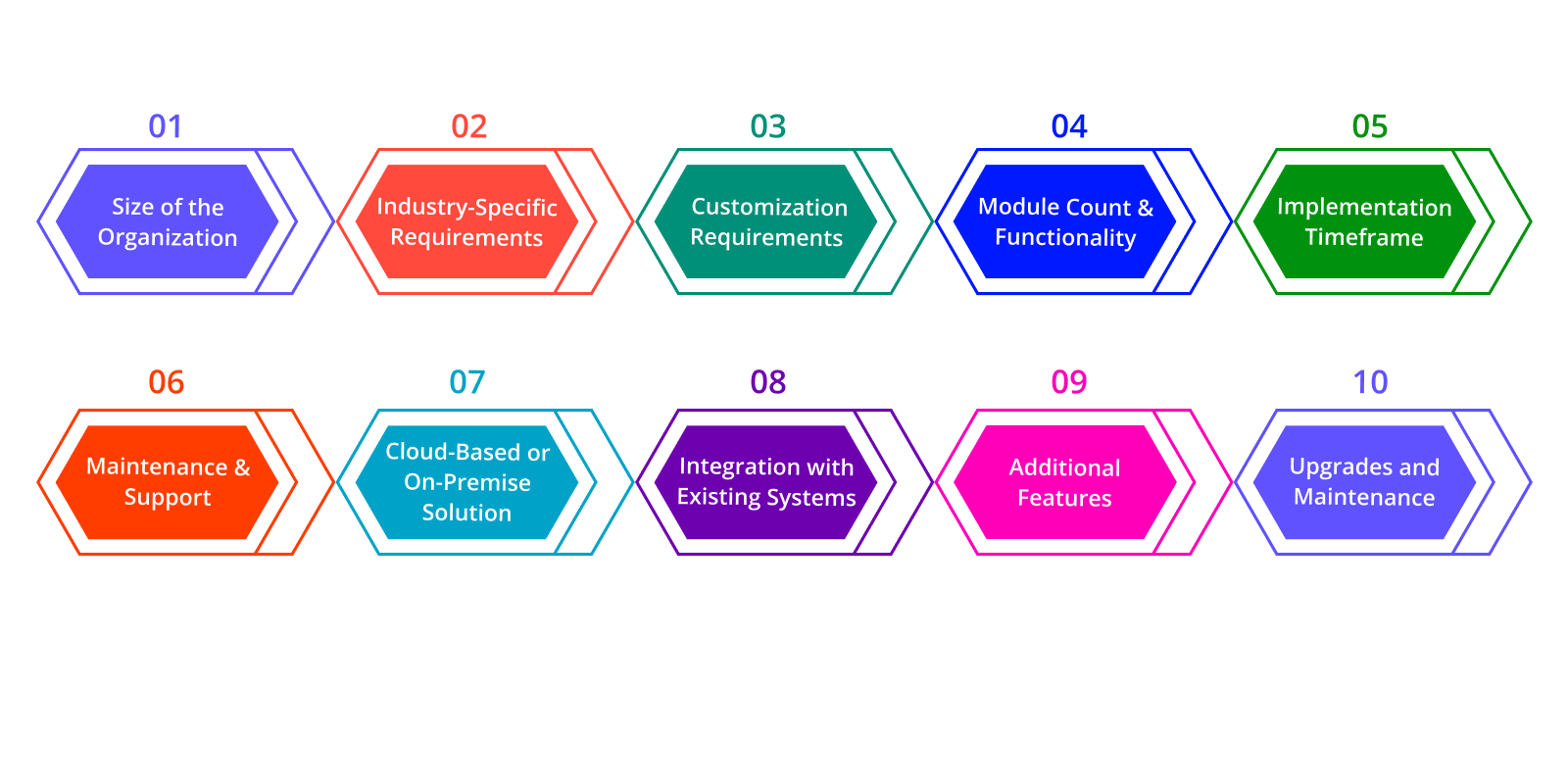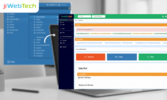- Sep 13, 2024
- Enterprise
- 3931
Share this post on:

Enterprise resource planning (ERP) software is a critical tool for businesses of all sizes, helping them manage various aspects of their operations including accounting, inventory management, supply chain management, and more.
However, one of the biggest questions on the minds of potential ERP adopters is: How much does ERP software cost? However, the cost of implementing an ERP system can vary significantly depending on various factors such as the size of the organization, the scope of the implementation, the chosen deployment model, and the specific features required.
In this blog post, we will provide a detailed breakdown of the pricing structure for ERP software, so you can make an informed decision when evaluating your options.
Estimated Cost of ERP Software:
The estimated cost of ERP software can vary widely depending on the vendor, deployment method, and complexity of the organization's needs. Here are some rough estimates based on the pricing structures mentioned above:
Perpetual License Model (on-premise): $50,000 to $200,000 or more, depending on the vendor and the size of the organization.
Subscription Model (cloud-based): $10,000 to $50,000 or more per year, depending on the vendor and the number of users.
Cloud Services Model: $5,000 to $20,000 or more per user per year, depending on the vendor and the organization's usage.
Pay-Per-User Model: $1,000 to $5,000 or more per user per year, depending on the vendor and the complexity of the organization's needs.
Tiered Pricing Model: Prices can range from $5,000 to $20,000 or more per user per year, depending on the vendor and the number of users.
Cost of ERP for Small Businesses
For a small business with $1 million annual revenue, ERP prices typically range from $1,740 to $4,620 per month, or $20,880 to $55,440 per year, without considering initial implementation, user training, or per-user costs. The number of employees in such businesses is usually between 50 and 1,500, leading to lower per-user expenses compared to midsize and enterprise companies.
Cost of ERP for Mid-sized Businesses
Midsize businesses earning $50-$100 million per year can expect to pay between $4,620 and $5,160 per month for an ERP system, with customization or integrations and the higher number of employees being major factors affecting the pricing.
Cost of ERP for Enterprise
For a company at the enterprise level, generating over $100 million in annual revenue and employing at least 1,000 individuals, the average monthly cost for an Enterprise Resource Planning (ERP) system is $9,330. Understandably, larger companies with more employees and extensive functional requirements will incur significantly higher upfront costs compared to their small and midsize counterparts. While it is evident that a global enterprise will pay more for software than a small business, there are additional factors to consider when determining the overall cost.
ERP Software Development Costs Across Different Industries
The cost of ERP software development can vary greatly depending on the industry and the size of the organization. Here are some approximate costs for different industries:
1. Manufacturing: For small to medium-sized manufacturers, the cost of ERP solutions can range from $5,000 to $20,000 per year, depending on the vendor and features required. Large enterprise manufacturers may pay over $50,000 per year for advanced ERP solutions.
2. Retail: For small retail businesses, the cost of ERP software can range from $2,000 to $10,000 per year, depending on the vendor and features required. Large enterprise retailers may pay over $50,000 per year for advanced ERP solutions.
3. Healthcare: For small healthcare providers, the cost of ERP solutions can range from $2,000 to $10,000 per year, depending on the vendor and features required. Large enterprise healthcare providers may pay over $50,000 per year for advanced ERP solutions.
4. Financial Services: For small financial services institutions, the cost of ERP software can range from $5,000 to $20,000 per year, depending on the vendor and features required. Large enterprise financial services institutions may pay over $50,000 per year for advanced ERP solutions.
5. Non-Profit: For small non-profit organizations, the cost of ERP software can range from $2,000 to $10,000 per year, depending on the vendor and features required. Large enterprise non-profits may pay over $20,000 per year for advanced ERP solutions.
Factors Influencing ERP Software Cost
Enterprise Resource Planning (ERP) software is a critical tool for businesses of all sizes and industries, enabling them to streamline their operations, improve efficiency, and reduce costs. However, the cost of ERP software can vary significantly depending on several factors. In this blog, we will explore the key factors that influence the cost of ERP software and provide insights into how businesses can make informed decisions when selecting an ERP solution.

1. Size of the Organization
The size of the organization is a crucial factor in determining the cost of ERP solutions. Larger organizations with more complex operations and greater numbers of users will typically require a more comprehensive and customized ERP solution, which can be more expensive. On the other hand, smaller organizations may be able to use a less complex and less expensive ERP system.
2. Industry-Specific Requirements
Different industries have unique requirements when it comes to ERP software. For example, organizations in heavily regulated industries such as healthcare or finance may require more extensive compliance features, which can drive up costs. On the other hand, businesses in less regulated industries may be able to use a more basic ERP system at a lower cost.
3. Customization Requirements
ERP software is often customized to meet the specific needs of an organization. The degree of customization required will impact the overall cost of the software. Organizations that require extensive customization, such as tailored workflows or integration with existing systems, may pay more for their ERP solution.
4. Module Count and Functionality
ERP software often includes a range of modules designed to address specific business needs, such as accounting, inventory management, and supply chain management. The number and complexity of these modules will impact the cost of the software. Organizations that require more modules or advanced functionality will pay more for their ERP solution.
5. Implementation Timeframe
The time required to implement an ERP system can vary significantly depending on the size of the organization, the complexity of the implementation, and the level of customization required. Longer implementation times will generally result in higher costs.
6. Maintenance and Support
ERP development company requires ongoing maintenance and support to ensure it remains functional and up-to-date. The cost of these services can vary depending on the vendor and the level of support required. Organizations that require more extensive maintenance and support may pay more for their ERP solution.
7. Cloud-Based or On-Premise Solution
The deployment model of the ERP software can also impact its cost. Cloud-based ERP solutions are typically less expensive than on-premise solutions, as they do not require hardware investments and have lower maintenance costs.
8. Integration with Existing Systems
ERP software often needs to integrate with existing systems within an organization, such as CRM or accounting software. The cost of integration can vary depending on the complexity of the integration and the level of customization required. Organizations that require more extensive integration may pay more for their ERP solution.
9. Additional Features and Functionality
Some ERP solutions offer additional features and functionality, such as business intelligence, mobile access, or data analytics. These features can increase the overall cost of the software. Organizations that require more advanced functionality may pay more for their ERP solution.
10. Upgrades and Maintenance
ERP software development requires regular upgrades and maintenance to ensure it remains functional and up-to-date. The cost of these upgrades and maintenance can vary depending on the vendor and the level of support required. Organizations that require more extensive upgrades and maintenance may pay more for their ERP solution.
Conclusion
The cost of ERP software can vary significantly depending on various factors, such as the size of the organization, the complexity of the system, customization requirements, deployment options, and the chosen vendor. Organizations must carefully evaluate their needs and budget to select the most suitable ERP solution. While the initial investment in ERP software development can be substantial, the long-term benefits, such as improved efficiency, reduced costs, and enhanced decision-making capabilities, can significantly contribute to the overall success of a business. So, if you are looking for an ERP development company that can help you streamline your business, look no further than jiWebTech . We offer the best ERP solutions to businesses and help them streamline their business operations seamlessly.










